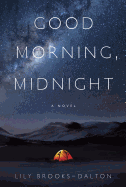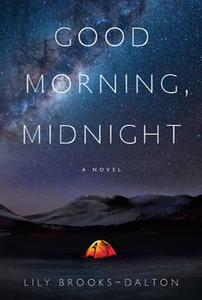
 Lily Brooks-Dalton's debut, Good Morning, Midnight, is a post-apocalyptic novel that hardly spares a sentence on the actual apocalypse. According to one of its protagonists, "the last news from civilization, over a year ago, had been of war," but there's never any mention of the specific calamity that seems to have overtaken almost the entire world simultaneously. Without any hints of plague or nuclear catastrophe, the reader is left to wonder why "the amateur waves were silent; the emergency communication satellites hummed an empty tune; even the military aviation channels were mute. It was as if there were no radio transmitters left in the world, or perhaps no souls to use them." Brooks-Dalton instead focuses her attention on characters already at the fringes of human civilization, struggling to deal with the utter isolation of a mysteriously quiet earth.
Lily Brooks-Dalton's debut, Good Morning, Midnight, is a post-apocalyptic novel that hardly spares a sentence on the actual apocalypse. According to one of its protagonists, "the last news from civilization, over a year ago, had been of war," but there's never any mention of the specific calamity that seems to have overtaken almost the entire world simultaneously. Without any hints of plague or nuclear catastrophe, the reader is left to wonder why "the amateur waves were silent; the emergency communication satellites hummed an empty tune; even the military aviation channels were mute. It was as if there were no radio transmitters left in the world, or perhaps no souls to use them." Brooks-Dalton instead focuses her attention on characters already at the fringes of human civilization, struggling to deal with the utter isolation of a mysteriously quiet earth.
The narrative toggles back and forth between Augustine, an elderly astronomer, alone in an Arctic observatory except for a quiet young girl named Iris, and the crew of the Aether, a spaceship making the lengthy return trip to Earth after completing a groundbreaking survey of Jupiter and its moons. Mission Specialist Sullivan, or "Sully," is one of the astronauts on board consumed by confusion and fear after Mission Control abruptly goes silent. Part of the fun of the novel is seeing how Brooks-Dalton manages to weave these two seemingly disparate stories together, drawing her protagonists closer to each other by ingenious narrative and thematic means.
The immediate challenges facing both Augustine and Sully are borne out of survival. Augustine seems satisfied to ponder the stars and burn through his remaining provisions until his discovery of Iris awakens long-buried parental instincts. He leads them on a dangerous overland journey to a more suitable Arctic home and desperately searches the airwaves for signs of humanity. On board the Aether, Sully and the rest of the crew deal with interpersonal conflicts, dangerous spacewalks and, most of all, the psychological toll of their uncertain journey. Sully, Devi, Ivanov and the others are forced to ponder disturbing questions: "And if everything went right, if they somehow made it home without mutiny or casualty, what then? What would be waiting for them? What kind of life?" Unlike plot-oriented science fiction novels such as The Martian, Good Morning, Midnight derives more tension from existential dread than dealing with equipment failures.
Lily Brooks-Dalton puts much of her writerly energies into introspection, having her protagonists delve deep into their copious emotional baggage. Before the calamity, Augustine and Sully preferred to focus on the stars rather than relationships, a course that left both of them with plenty of regrets. When not deliberately engaged in the business of survival, the protagonists reflect on their pasts and the choices they made or avoided making. Augustine speaks for himself and Sully when he reflects that "his gaze had always been far-flung." Here, at the end of the world, Brooks-Dalton turns her protagonists' gaze inward. --Hank Stephenson, bookseller, Flyleaf Books
Shelf Talker: Good Morning, Midnight is an excellent addition to the literary-dystopic canon, with its thoughtful approach to characters forced to reconsider what matters most in the face of possible human extinction.

